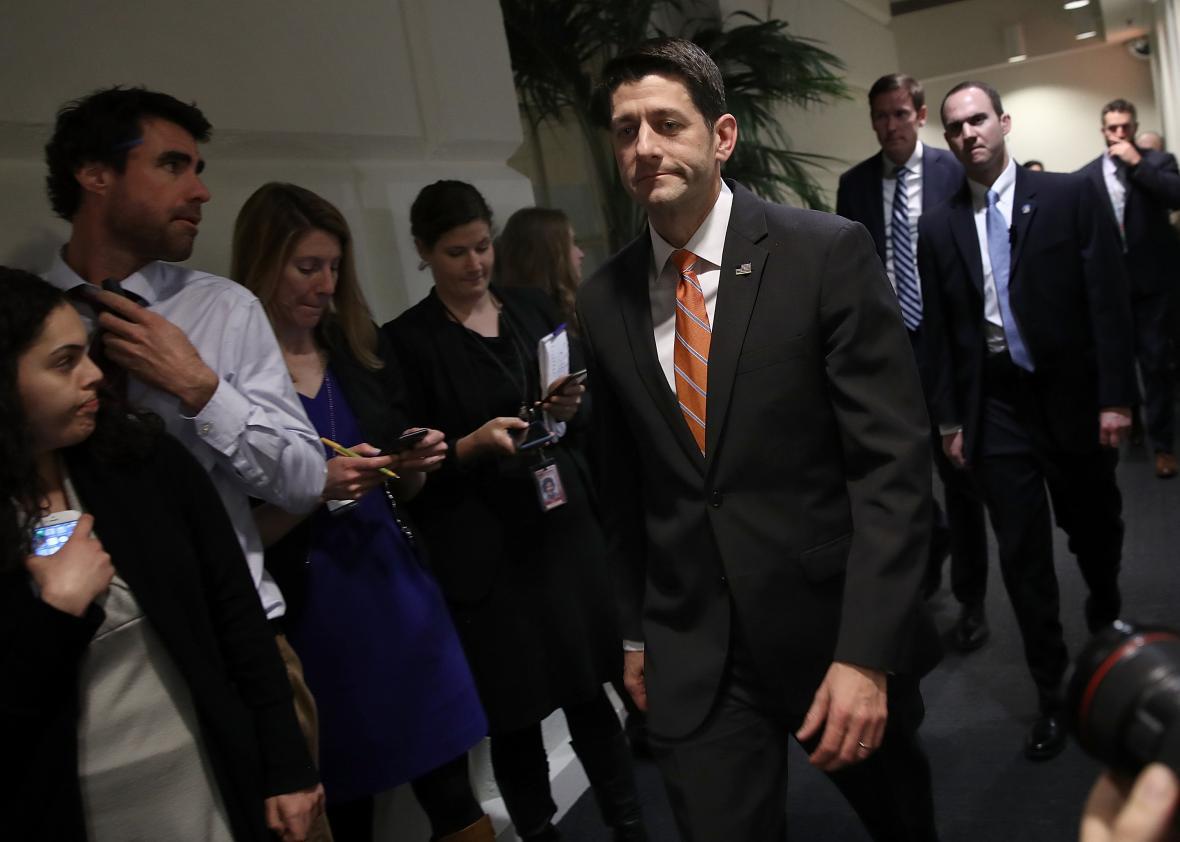There has been one endgame strategy with Trumpcare for a month: Eventually just put the bill on the floor, and dare members to side either with it or with Obamacare. This will be put to its test Friday, after a Thursday of collapsing negotiations and ongoing recriminations surrounding the American Health Care Act. Donald Trump has said negotiations are over, and now he just wants a vote. Members will either be with the AHCA, polling at about 17 percent popularity, or they will be with Obamacare.
It may … work?
House Republicans met for a 7 p.m. meeting Thursday night that lasted about 90 minutes. I was expecting an abject horror show of sullen faces and terse no-comment responses from members as they came out, but they were surprisingly optimistic about the votes falling in place on the floor.
“You don’t get everything you’d like,” Texas Rep. Joe Barton said afterward. A member of the Freedom Caucus, Barton had been leaning no. Thursday night he said that he’ll vote yes, because it’s the only choice.
The meeting served as a clearing of the air and a rallying call for unity. Members of both the moderate Tuesday Group and the conservative Freedom Caucus spoke up about the process and where they were coming from. Several members spoke about the effect of a speech by Rep. Brian Mast, a double amputee veteran, urging everyone to come together.
Speeches are fine. But there were also policy changes afoot, along with “assurances” being made in private.
Some final amendments were finalized before negotiations wrapped. Rep. Kevin Brady, a lead author of the bill as chairman of the Ways and Means Committee, said that another $15 billion would be added to the bill’s patient and state stability fund—on top of the $100 billion already there—so that states could address “mental health issues, maternity care, infant care, and substance abuse issues.”
Why more money for those specific benefits? Because the final bill will eliminate the Affordable Care Act’s 10 essential health benefit requirements, including in these areas, beginning in 2018. (Republicans like to describe eliminating federal benefit guarantees as allowing “each state to determine its list of essential benefits,” in case you happen to see that particular gloss floating around.) The benefits that Brady listed are the ones most endangered by that repeal as insurers find them no longer worth offering.
Brady also said that the ACA’s Medicare surcharge on high-earners (a TAX!) would be extended another six years to cover for the cost of the essential benefit repeal and allow the bill to be revenue neutral so that it can pass through reconciliation in the Senate. “We expect the CBO to score that more people will choose health care plans,” Brady said, “because they’ll be more affordable for them, so that will cost money.” You can read more about this dynamic on Slate. We will not see a Congressional Budget Office score on this latest batch of amendments, including the significant policy change regarding essential health benefits, before the Friday vote, though.
“The Freedom Caucus has improved the bill significantly,” Arizona Rep. Trent Franks, a Freedom Caucus member and holdout, said after the meeting.
The change in tune from Franks and Barton suggests that the Freedom Caucus may have just been holding out for this precise moment, when Trump called negotiations over, to declare victory. Not all of them will vote yes, but the most torn ones will. Nor will another $15 billion thrown at states turn around all moderate defectors. But can leaders eke out 216 votes, perhaps after a lengthy floor vote involving some indiscreet arm-twisting? Maybe!
“Each member is really going to have to search their conscience tonight and come back tomorrow afternoon and realize, it’s a vote to maintain Obamacare or it’s a vote to get rid of Obamacare,” New York Rep. Chris Collins, one of Trump’s most loyal Hill allies said. “Those who say they want to get rid of more of it, or that it’s Obamcare Lite? This is it. It becomes a binary choice tomorrow.”
And if it prevails, it will head to the Senate, where it may well be found in violation of multiple planks of the Byrd Rule, and where not many senators like it.
